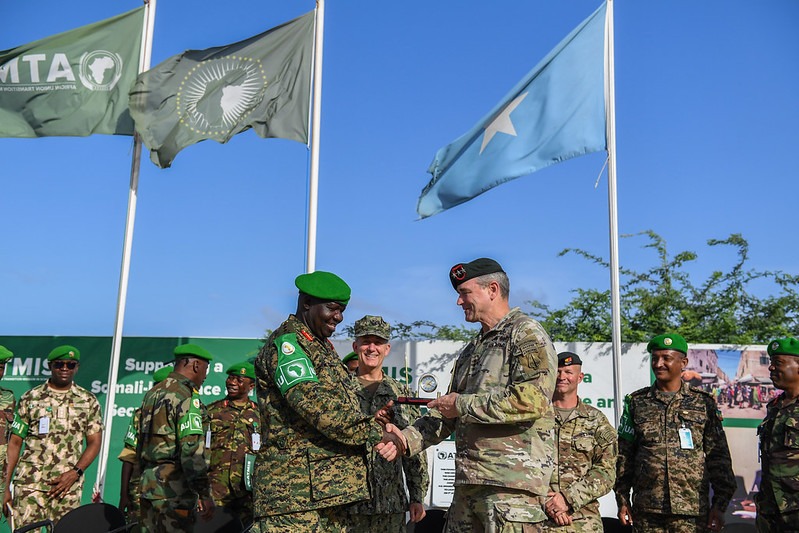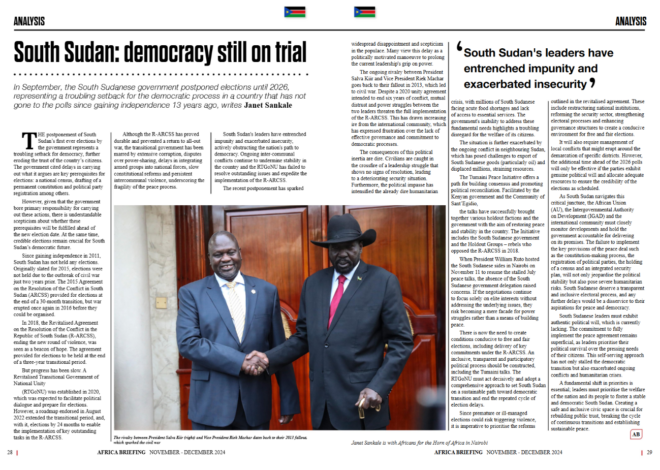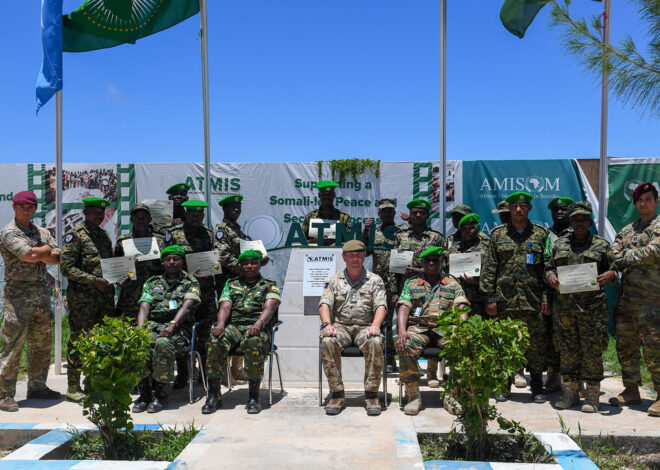Withdrawal of ATMIS troops from Somalia will undermine national and regional security

Following 17 years and three extensive international peace missions, the Federal Government of Somalia is now preparing to assume complete responsibility for its own security. African Union Transition Mission in Somalia (ATMIS) plans to withdraw over 2,000 peacekeepers from Somalia in the upcoming weeks as part of its commitment to the United Nations Security Council
(UNSC) resolutions.
As Somalia grapples with persistent challenges, including but not limited to political instability and the presence of extremist groups, the withdrawal of the ATMIS) troops could have far-reaching implications on national and regional security.
Since its deployment in 2007, ATMIS has played a crucial role in countering the threat of Al-Shabaab and facilitating the stabilization of Somalia. Taking over from the African Union Mission in Somalia (AMISOM) on 1 April 2022 after their dedicated service of over 15 years, ATMIS has remained steadfast in assisting the Federal Government of Somalia in executing the Somali Transition Plan. Its primary objective is to facilitate the transfer of security responsibilities to the Somali security forces and institutions.
The gradual transfer of security responsibilities from international forces to the Somali authorities is expected to end on December 31, 2024. The decision is a move for the country to adequately meet its security needs.
Despite ATMIS efforts to strengthen Somalia’s central government, the country continues to grapple with the challenge of combating al-Shabaab, an Islamist insurgent group that has capitalized on the feebleness of Somalia’s central government since its inception in 2006. It has managed to gain control over significant portions of ungoverned territory such as Banadir, Bay, Hiraan, Lower and Middle areas of Shabelle, Lower Juba regions and the country’s capital of Mogadishu.
Just after the announcement of the withdrawal of troops, recent reports have emerged that Al-Shabaab fighters have attacked a military base housing Ugandan forces of the African Union peacekeeping mission in Bulamarer, southwest of the capital, Mogadishu, on May 26, 2023, killing about 54 soldiers. The insurgency has proved resilient and remains to be a security challenge in war-torn Somalia, despite counter-terrorism efforts by regional peacekeeping missions.
Withdrawal at this time would be detrimental to the progress that has been made and could have severe consequences. The continued presence of Al-Shabaab presents another major concern. Although the extremist group has suffered setbacks, it remains a potent force capable of launching attacks and destabilizing regions. The departure of ATMIS troops might embolden Al-
Shabaab and create a security vacuum that could be exploited.
For many years, Somalia has faced significant challenges related to political fragmentation and a lack of centralized authority that has significantly affected democracy, economic growth and international relations. As such, it has been extremely difficult to establish an effective governance and national security structure. The resolution of the leadership crisis and the prolonged presence of ATMIS is of utmost importance for Somalia’s security and economic development. If left unresolved, the civilian population may be subjected to numerous human rights violations including crimes against humanity particularly if the extremist group Al-Shabaab takes advantage of the leadership divides and uncertainty arising from the crisis of central governance. Moreover, the withdrawal of ATMIS troops could exacerbate existing divisions and power struggles, potentially leading to increased unrest and hindering efforts to strengthen the nation’s security apparatus.
Somalia’s security forces have made progress with the support and training provided by ATMIS. However, they still lack the necessary capacity and capabilities to independently address the security challenges posed by Al-Shabaab. The withdrawal of ATMIS troops will leave a significant gap in terms of military expertise, equipment, and resources. It will be a considerable challenge for the Somalia Security Forces to fill this gap promptly, potentially compromising the country’s ability to maintain stability and counter the insurgency.
While the withdrawal of ATMIS troops signifies progress in Somalia’s journey toward self-reliance, it does raise concerns about the potential threats to national security. The foremost challenge is the ability of the Somali security forces to effectively fill the void left by the departing peacekeepers.
The humanitarian situation in Somalia is dire. Somalia is facing the worst drought in decades amidst armed conflict. The security implications of ATMIS troop withdrawal extend beyond the immediate threats posed by extremist groups. Insecurity hampers humanitarian efforts, making it difficult for aid organizations to operate and deliver much-needed assistance to vulnerable
populations. The withdrawal will exacerbate the already dire humanitarian situation in Somalia, where millions of people are dependent on international assistance for their basic needs. Without a secure environment, humanitarian organizations face increased risks, limiting their ability to provide life-saving aid.
Despite notable progress, the national forces still require further training, capacity building, and resource allocation to assume complete responsibility for security in their country. However, the security situation in Somalia remains fragile and requires continued support from ATMIS to prevent further destabilization.
Somalia’s security challenges have regional implications. Instability in Somalia can spill over into neighbouring countries, exacerbating existing conflicts and creating new ones. The resurgence of Al-Shabaab and the potential for an increase in piracy activities off the coast of Somalia can disrupt maritime trade routes, impacting regional and global economies. Regional cooperation and support are crucial in addressing the security concerns stemming from the withdrawal of ATMIS troops.
The exit of the United States from Afghanistan provides valuable lessons that regional blocs such as the AU, UN, and others should take into consideration. Currently, the Horn of Africa is facing challenges with the war in Sudan and the recently resolved conflict in Ethiopia. Consequently, the withdrawal of ATMIS could potentially lead to the resurgence of Al-Shabaab and subsequent
control over Somalia. This situation would not only exacerbate the existing refugee crisis but also provide a safe haven for terrorist activities. Therefore, it is crucial for regional organizations to carefully consider the implications of the US exit from Afghanistan and take proactive measures to prevent similar consequences in the Horn of Africa.
The withdrawal of ATMIS troops from Somalia raises significant concerns for the country’s national security. The resurgence of Al-Shabaab, a capacity and capability gap in the security forces, political fragmentation, potential humanitarian crisis, and regional security implications are among the key challenges that need to be addressed. It is crucial for the international community, Somali authorities, and regional partners to work together to ensure a smooth transition, strengthen the capabilities of the Somali security forces, and provide continued support to stabilize Somalia and counter the threat of extremism. Failure to address these
challenges adequately could have severe consequences for the security and stability not only of Somalia but also of the wider region.
Janet Sankale is Communication and Outreach officer for the African for the Horn initiative



